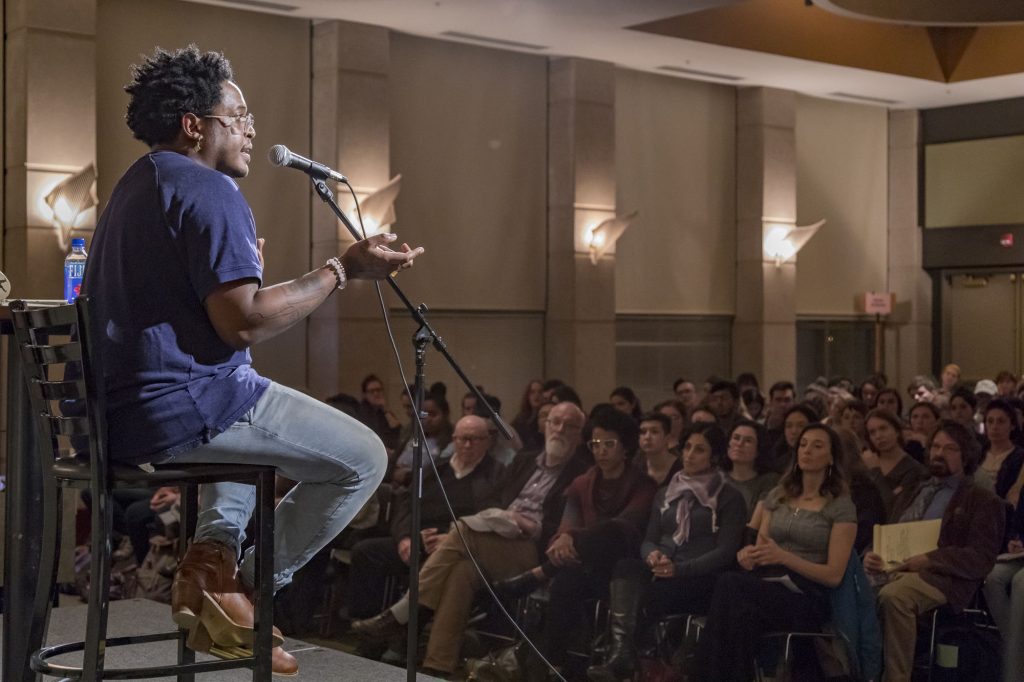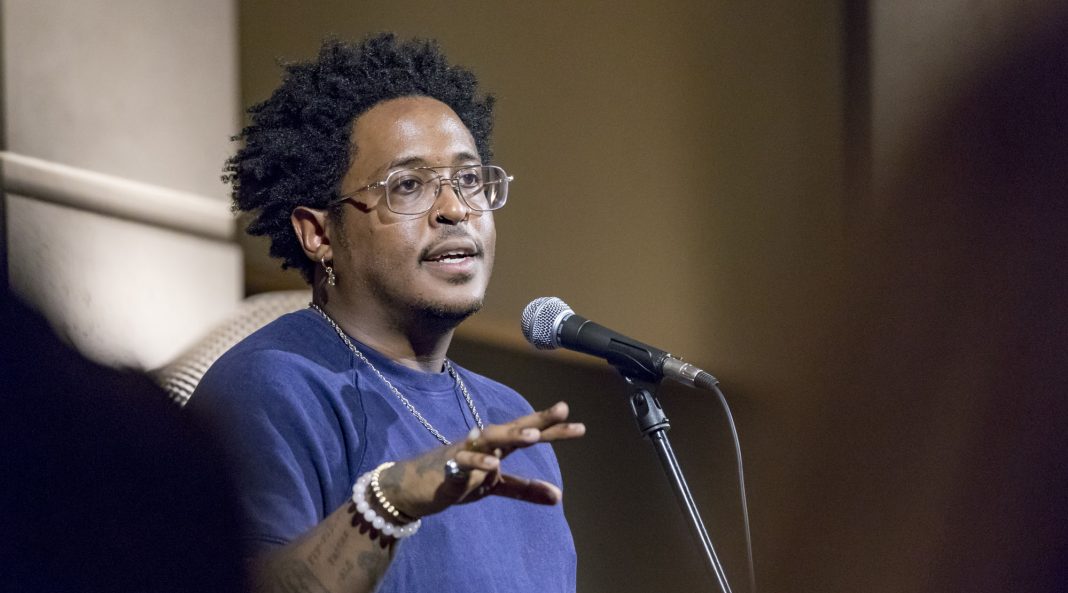“THIS PLACE IS ALIVE!” my notes shout gleefully at me. The words are scrawled out, barely legible. I’m not even looking as I write them. I’m outside the thin, blue, college-ruled lines. I’m here, right here, and this moment is the place to be. Danez Smith, from their perch upon the almost-bare stage, invites us all to yell, to stomp, to holler, to respond; their performance is a two-way street paved with hands raised in praise and the unrestrained cries of affirmed truth. Yes, this is the place to be: this is an experience, an occasion for expression, a site of freedom and declaration and the birth of a world reimagined.
The fourth visiting author of the Living Writers series gave this public reading on Oct. 24 after a question and answer session with the Living Writers classes was held earlier the same day. Smith, who is based in St. Paul, Minnesota, describes themself on their website as “a Black, Queer, Poz writer & performer.” They have authored two collections of poetry, Don’t Call Us Dead, which was a finalist for the National Book Award, and [insert] boy, as well as co-hosting the poetry podcast VS with friend and fellow writer Franny Choi and participating in the Dark Noise Collective, a group of artists with the goal to, as Smith describes, “make love intentional.”
Smith’s reading in Miller Forum was the most well-attended Living Writers event so far this semester – students, faculty and community members alike filled up every available seat, so some gathered against the back wall, all aiming to hear the poet live in all their genius. Some audience members, like Asherdé Gill ‘20, had been following Smith’s work online well before their appearance at ‘Berg.
“I first learned of Danez Smith when I was a freshman in college. I was searching for poets that shared similar identities with me and instantly connected with their work,” said Gill. “If I was religious, Danez Smith’s poetry would be my religion. It is my home; the place where I roam without shame.”
“If I was religious, Danez Smith’s Poetry would be my religion. It is my home; the place where I roam without shame.”
Smith deconstructs this shame within their work, tearing it apart and thrusting some of the most stigmatized aspects of life out into the light. They read poems about sex and the journey of self-exploration, poems that rework the very fabric of America, poems that become verbs and take their own initiative to act beyond their author’s control. Living Writers student Bri Dailey ‘19 recalls the profound impact this fearless reading had on them.
“I knew that Smith was going to be a phenomenal performer of their work, but I didn’t realize the extent to which I would be absolutely swept away by their reading. Smith carried the audience through the deepest depth of each emotion, seamlessly waltzing us from laughter into solemn stillness into gasping shock,” Dailey said. “As a non-binary person who uses they/them pronouns, Smith’s work brings me such hope. Their talent, skill, and success demands academic and online presences alike to pay attention and respect to people of genders outside the binaries, particularly people of color, whose trans-ness is so often erased or ignored by the media.”
The spellbinding quality of Smith’s reading was echoed by Gill, for whom one poem out of the total 11 was particularly significant.
“A moment that filled me with life was finally getting to see Danez perform ‘dear white america,’” said Gill. “I previously watched Danez perform this poem on YouTube, and as good as the YouTube video was, nothing compares to the energy I felt actually being in the room with them. I felt the love, anger, and pain that went into writing that poem enter my soul and tell me that my feelings were justified; my anger and my hurt is justified. This reading allowed me to feel emotions that I have been locked inside of me for so long. A line that will always stick with me is ‘i tried to love you, but you spent my brother’s funeral making plans for brunch, talking too loud next to his bones.’”
On the page, this poem makes a rectangular block of text. Unlike many other poems in Don’t Call Us Dead, there are no line breaks every few words, no winding paths of thought to follow with wandering eyes. It’s all just there for the reader to digest sentence by sentence, a statement screaming in almost all lowercase letters, a soul tired of explaining and explaining and explaining what we’re doing wrong here. But it must be said – it must be said, or someone who needs to hear it might never do so. During the question and answer session, Smith described that they choose different poems to read to different audiences: mostly black audiences, for instance, might not be read “dear white america” because it reflects experiences the audience lives on a daily basis. For an audience like Muhlenberg, a primarily white institution, they said, “It’s important for you all to see this. [It might] change somebody’s mind.”

At the reading, this poem is a different being than its paper-and-ink counterpart – not better, just different, a thing that breathes. Smith’s voice ebbs and flows, reaching a fever pitch and floating back down to quiet disappointment like a feather. They change their tenor completely as they read italicized lines, riffing off of the music of the words on the page. They turn commas into an unbearable alarm of repeating family members, their time all wasted; they go off the page; they feed off of the crowd’s growing roar; they repeat and remix until they reach a culminating question mark. “i have left Earth,” reads Smith, and so have we – we’re wherever they are, somewhere where the world’s knocking on the double doors but isn’t allowed in, not yet. Right now, we have this.
“It was a performance in every sense of the word; I clapped, cheered, cried, was angered, was ashamed, laughed again, on and on,” said Pierce Lockett ‘19, an audience member. “I brought a notebook to write down some key images or lines, but their words on the page hardly captured what it was I felt, what energy their poetry conveyed. Danez had my undivided attention and for that reason I left thinking, ‘Yeah, this is what poetry is supposed to be. I’m supposed to feel my bones separate from the rest of my body,’ without feeling like anything was forced or excessive. I was (and we all should be) deeply indebted to their coming to Muhlenberg … Their work is embodied, more so than I could have ever expected. I was also so unprepared for how hysterical they were! … Danez was right there, making you feel that poetry was like a live wire. And it is!”
As Lockett states, Smith’s personality goes far beyond the dark and high-stakes tone of some of their work. During the question and answer session, Smith was kind and downright delightful. They smiled and said hello to every single person who went up to the microphone and found ways to address each question with a great deal of thought and interest. In their presence, students shared personal stories of discrimination, worked through starstruck nervousness and reflected on familial struggles. Through it all, Smith cracked jokes as easily as they dropped lines of speech that sounded straight out of one of their poetry books. When asked how queer artists can cope through persecution and hardship, they talked about making art outside of the realm of activism as a mechanism of healing: “Poems are sad. Poems are defeated. Poems are everything a human can be.” Like their conception of poetry, Smith refuses to be defined or collapsed. “[My work is] just as hip-hop as it is Whitman,” they said. “Just as interested in Yeats as it is Yeezy.”
Gill believes that this multiplicity is central to Smith’s cultural relevance.
“Danez Smith’s poetry unapologetically calls out the things that are messed [up] in our personal lives, in this country, and in the world,” said Gill. “In this political climate, while we’re all living under a racist, transphobic, homophobic, sexist and ableist government, it is important to have writers that constantly fight against it. At the same time, it is important to have writers that create a space in their work for people that are hurting to heal. I feel seen, heard, loved and nurtured in their poetry.”
Smith’s final poem of the night, “dinosaurs in the hood,” crafts a pitch for a movie about a black boy and all those in his community fighting a dinosaur invasion, “Jurassic Park meets Friday meets The Pursuit of Happyness.” After imagining scenes of grandmothers triumphing over reptilian foes and refuting old tropes that hinge on stereotypes, the poem ends with the black boy’s assertion of life (“& no one kills the black boy” repeated four times) and the opening image of pure childlike wonder, the boy with a plastic dinosaur seeing a real one approach him on the bus, “his eyes wide & endless / his dreams possible,” – breath – “pulsing &” – breath…
Smith pauses here, their voice barely above a whisper. Their eyes fix on a spot in the distance. Their eyebrows rise. They extend one arm, index finger pointed, slowly, slowly, shaking. They’ve become that little black boy, in all of their curiosity and undeterred opportunity, they raise their voice and that trembling finger to the impossible dinosaur we can’t see –
“right there.”
The next Living Writer, author Téa Obreht, visits campus on Nov. 7.






















